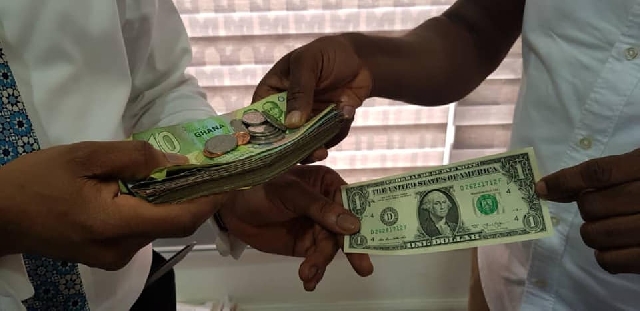Senior Economist at Databank Research, Courage Martey is hopeful the cedi will continue to see some stability against the dollar compared to other currencies across the continent due to the bi-weekly FX forward auction being undertaken by the Bank of Ghana (BoG).
The bi-weekly FX forward auction, which was introduced by the BoG in 2019, allows the central bank to sell the dollar in forward sale deal.
“With the bi-weekly auction, the dollar is sold forward. So if the dollar is sold forward at a particular price, it means that forward pricing has already been determined so there is a benchmark for forex trading. It means that you don’t need to panic buy on the stock market when you don’t need it now,” Mr. Martey told the B&FT in an interview.
He explained that the practice of panic buying in the past was a major contributor to the cedi depreciation, a challenge that have been resolved by the introduction of the FX forward auction.
This, he said, coupled with the country’s diversified export base provides a constant inflow of the U.S dollars.
“Our export base is more diversified than our peers. So for instance, if you pick our exports you will see that gold accounts for about 40 percent. There is also crude oil and cocoa. When you look at the price dynamics gold is doing very well because of the uncertainties as oil prices fall,” he said.
Reacting to a caution captured in the report stating that the local currency may experience some depreciation due to coupon repatriations ahead of the December 7 elections, Mr. Martey noted that the records show that the performance of the cedi has been fairly stable mostly in the first term of an incumbent government during election years.
He however added that the uncertainties among investors generally about African elections could pose a major challenge even though Ghana in particular has demonstrated that it is politically stable.
About the 2020 Flash Note report
According to the report, the performance of the local currency can be attributed to a combination of a diversified export base and reduced import activity among others.
“The Ghana Cedi has held relatively firm this year compared to a number of its African peers, amidst significant capital outflows occasioned by the pandemic. A combination of a fairly well diversified export base, robust forex reserves and reduced trade and import activity seems to have supported the currency”, the report noted.
The report further noted that “the Ghana Cedi has only depreciated by 1.6 percent year-to-date compared to a 9.6 percent year-to-date depreciation, during the same period in 2019.
The GH cedi has, on average, depreciated by around 10 percent against the US dollar on an annualised basis, in the last 5 years.”
The August Flash Note also applauded the central bank for putting in place measures that ensured that the local currency remained stable over the past few months. The report said “Sustained forex interventions by the BoG, coupled with strong mining flows, have kept the cedi stable over the past few months. BoG interventions year-to-date are US$1.86 billion in spots and forwards, in large part thanks to the much bolstered forex reserves position, compared to US$1.36 billion during the same period in 2019.”










